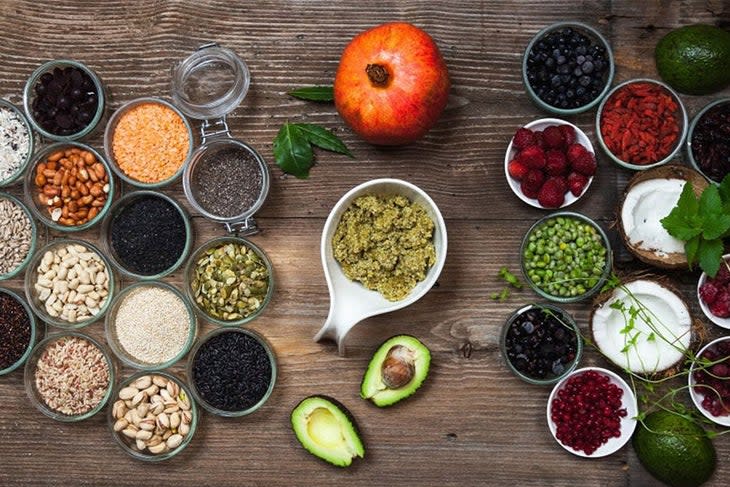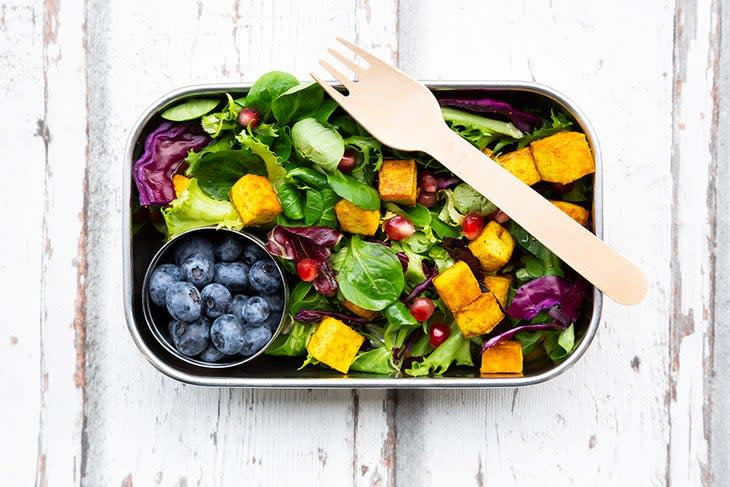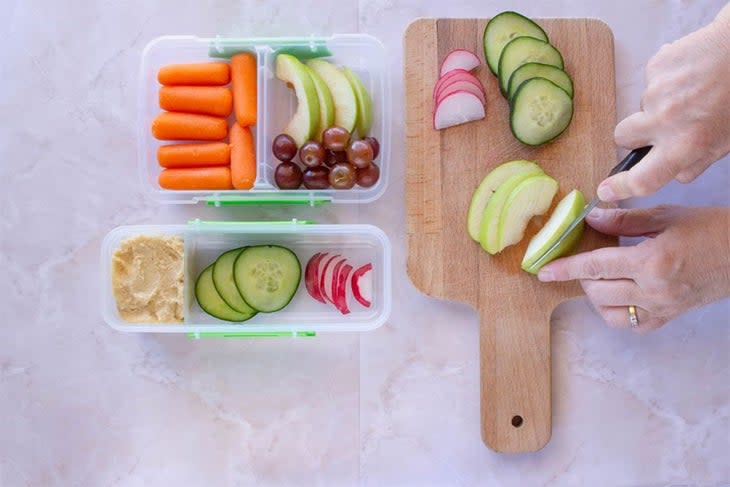Everything You Need to Know About Meal Prepping
This article originally appeared on Oxygen
Ever fantasize about how much easier life would be if you were a snake? You know, so that you'd only have to eat once a week! Just think about all the time you'd save each day not constantly having to find recipes, buy groceries, wash, chop and cook ingredients, and clean up a messy kitchen. Nirvana, right?
The solution you're seeking is simple: meal prep. But what does meal prep mean? Instead of going through the grueling daily routine listed above, you choose to plan and prepare some or all your meals in advance. This could mean making your lunch the night before, cooking in batches, or precooking all your food and portioning it out for the week in grab-and-go containers.
The beauty of meal prep is that it can adapt to fit your cooking expertise, lifestyle and personal dietary needs -- and it certainly doesn't need to look like an artfully plated Pinterest- or Instagram-worthy masterpiece if your skills aren't worthy of a Michelin star.
"Meal prep is like creating your very own line of microwaveable meals tailored to your exact preferences," says Gabrielle Fundaro, Ph.D., exercise science professor, certified sports nutritionist and Renaissance Periodization coach. "Many people like to pack all their breakfasts for busy mornings or lunches to eat at the office. Or you can also choose which meals you'd like to prep if you don't want to take on every meal for the week."
The 7 Benefits of Meal Prepping
Why meal prep? There are many reasons it's considered a best practice. Emmie Satrazemis, RD, CSSD, nutrition director at Trifecta, names the following seven benefits:

1. Temptation Removal
Ever been hit with hunger and have nothing on hand to eat? Yeah, that probably happens on the daily. And perhaps the only thing nearby is fast food or that leftover birthday cake your co-worker brought into the office. Meal prepping ensures you always have options that fit your dietary needs because you've planned in advance and brought your own food (or have something easy to grab from the fridge if you get a case of the munchies while watching TV). This makes sticking to your diet significantly easier.
2. Total Control
When you are cooking your own meals or planning what to eat in advance, you get to be a total control freak (in a good way). You gain complete calorie control and macro balance, and you limit usage of unwanted ingredients like added sugar, salt and fats. You are also ensuring you get the best-quality options and more fresh ingredients because you are selecting them yourself. In short, meal prepping is good for weight loss and for maintenance.
3. Hunger Manager
One of the benefits of meal preppingis that it helps you manage hunger because you are able to eat as soon as you feel hungry rather than having to wait to decide and then find a food source. Managing hunger often means you won't overeat when you finally sit down for a meal because you won't be as insanely famished.
4. Timesaver
When done properly, meal prepping can save quite a bit of time. Whether you simply pre-chop ingredients or cook all your meals for the week each Sunday afternoon, when you get home after a long day, you'll be thankful you don't have to take the time to go to the store or perhaps even cook. This may leave you with more time to work out, play with your kids or even enjoy a guilt-free bubble bath because you deserve it.
5. Money Saver
Pricing out your food in advance is another piece of the meal-prep equation, which means your portion control now has cost control. You are likely saving money because you aren't ordering out every lunch and/or dinner and can choose your meal-prep recipes based on sales at the grocery store if you wish.

6. Waste Eliminator
This goes hand in hand with saving money: Once you have a meal-prep routine established, you'll know exactly how much of each ingredient you need, which also cuts down on food waste. You'll never again have to witness your fruits and veggies wither away in the crisper drawer while you call for takeout.
7. Stress Remover
Have you ever noticed how dieting, especially cutting calories, can cause you to think about food all.day.long.? Not to mention, your willpower gets drained much faster and you are more likely to go off your plan when you're tired or "not in the mood" to make healthier choices. One of the most important benefits of meal prepping is that it can help reduce the stress that comes with trying to eat healthier. Solving all your food decisions in advance really frees up some of your willpower and mental stress, helping you reach your goals faster and with more ease.
"There is no one-size-fits-all approach or a 'right' way to meal prep," Fundaro says. "Meal preppingis a learning process, and it's meant to help simplify your routine and lifestyle. It's a success if you've made your diet more nutritious while saving time and money."

10 Tips for Easy Meal Prep
When it comes to fear-inducing words, "meal prep" seems to rank right up there with "Heeere's Johnny!" from The Shining. But is preparing meals in advance really so scary? Perhaps the terror arises as you picture your entire Sunday being ruined slaving away in the kitchen. Or maybe you're afraid your meals will be tedious and bland if you have to eat from the same large batch of turkey chili all week. No? Well, could you simply have a fear of failure, knowing that planning ahead isn't your strong suit?
The truth is, none of these concerns will come to fruition if you're meal prepping properly. Of course, as the saying goes, failing to plan is planning to fail. If you are serious about losing weight, packing on muscle or simply adding more veggies to your life, then meal prep is the holy grail.
Luckily, Fundaro is here with some meal-prep help. She's compiled the following tried-and-true tips and tricks to help set you up for success:
Start small.
Identify and tackle your weak spots first -- the meals or snacks that need the most attention. For example, if you're eating out every night, then start with dinner. If you can't figure out how to fit in a proper breakfast after your fasted morning workout, start with your postworkout meal.
Keep it simple, stupid.
Variety is the spice of life, but build that in over time. Initially, it's more important to keep meal prepmanageable so you're more likely to stick with it. Pick just a few proteins, veggies and starches to cook. Go ahead and pack some items raw if you don't want to cook everything. Buy pre-chopped veggies, bagged salads, and frozen and canned produce to minimize prep time. Take baby steps so you don't feel overwhelmed. That being said, if you are a proficient cook, adding culinary flair to your meal prep will stave off potential boredom. In that case, don't be afraid to add some more advanced recipes to your meal-prep rotation.
Make a list, check it twice.
The most surprising meal-prep help? It's not a sous chef, it's a grocery list! Write it down ahead of time, and remember to include items like spices, marinades and any prep tools you might need, like tinfoil or a big baking sheet. The initial trip may be a big investment, but once you've gotten into a routine, you'll be able to beeline to the exact ingredients you need for your staple recipes. You may need to grab some fresh fruits and veggies midweek, but you'll still save plenty of time by stocking up in advance.
Make cleanup a breeze.
Simplify the prep and cleanup processes with big freezer bags, tinfoil and cooking spray. You can toss ingredients in a bag with seasoning or marinade to quickly and evenly coat them. After roasting or baking, you can toss the tinfoil and your pan will immediately be ready for another round. Also, wash dishes as you go so you aren't overwhelmed by a big pile in the sink.

Practice those knife skills.
Chop ingredients in advance and in similarly sized pieces so they all cook evenly. Keep in mind that they may need to cook separately, though: Compared to sturdy veggies like broccoli, cauliflower and carrots, softer veggies like zucchini or yellow squash will cook much faster at the same temperature. If you put them all together on the same pan, you may end up with a mixture of burned and undercooked veggies.
Order matters.
Save even more time by multitasking. Start your baking or roasting first, then move to stove-top cooking and microwaving. You can roast your sturdy, starchy veggies while you saute some chicken breast. Potatoes bake quickly in the microwave, and you can find bags of steamable veggies at most grocers.
Frozen is fine.
Frozen fruits and vegetables are at least as nutritious as the fresh versions. Because they're frozen immediately after being taken off the vine, they may have even better nutrient integrity than the fresh alternative, which have spent days or weeks in transit before arriving at the grocery store. Plus, they last a lot longer. Fruits and vegetables with a low water content freeze well, so you can always chop and create your own blends that are identical to the store brand. Simply toss a mixture of broccoli, cauliflower and carrots into a freezer bag, press all the air out and throw it in the freezer. You're ready for the next meal prep!
Prevent waste.
If you are using a buffet-style meal prep, weigh your bulk items before and after cooking to determine your yield. You'll then know exactly how much you need to buy on your next shopping trip. This prevents both food waste and an inconvenient midweek emergency shopping trip.
Freezing and reheating.
You can freeze and reheat meals that you've already cooked, and in most cases, this doesn't affect the taste or texture. However, there are some exceptions: Fully cooked potatoes, zucchini and leafy greens do not rejuvenate after a freeze-thaw cycle. Experiment with just a small batch first if you want to test your recipe.
Food safety.
In general, cooked food is safe for three to four days in the fridge. If you won't eat all of it within that time frame, you can freeze it for a couple of months. Use an erasable marker on your prepped containers and a permanent marker on anything that goes into the freezer in order to document the date it was prepared or frozen. Also, when you're done prepping, food should be refrigerated within two hours of preparation but ideally immediately.
At the end of the day, the best way to meal prepis to find what works best for you and have fun as you try new methods and recipes. "I will be the first to say that I have limited culinary skills, and I'm more likely to end up on Pinterest Fails than Food Network," Fundaro says. "Successful meal prep doesn't require professional plating, intricate recipes or the fanciest bento boxes. Laugh at and take pictures of your hilarious 'recipe fails' because we've all had them."
For exclusive access to all of our fitness, gear, adventure, and travel stories, plus discounts on trips, events, and gear, sign up for Outside+ today.

